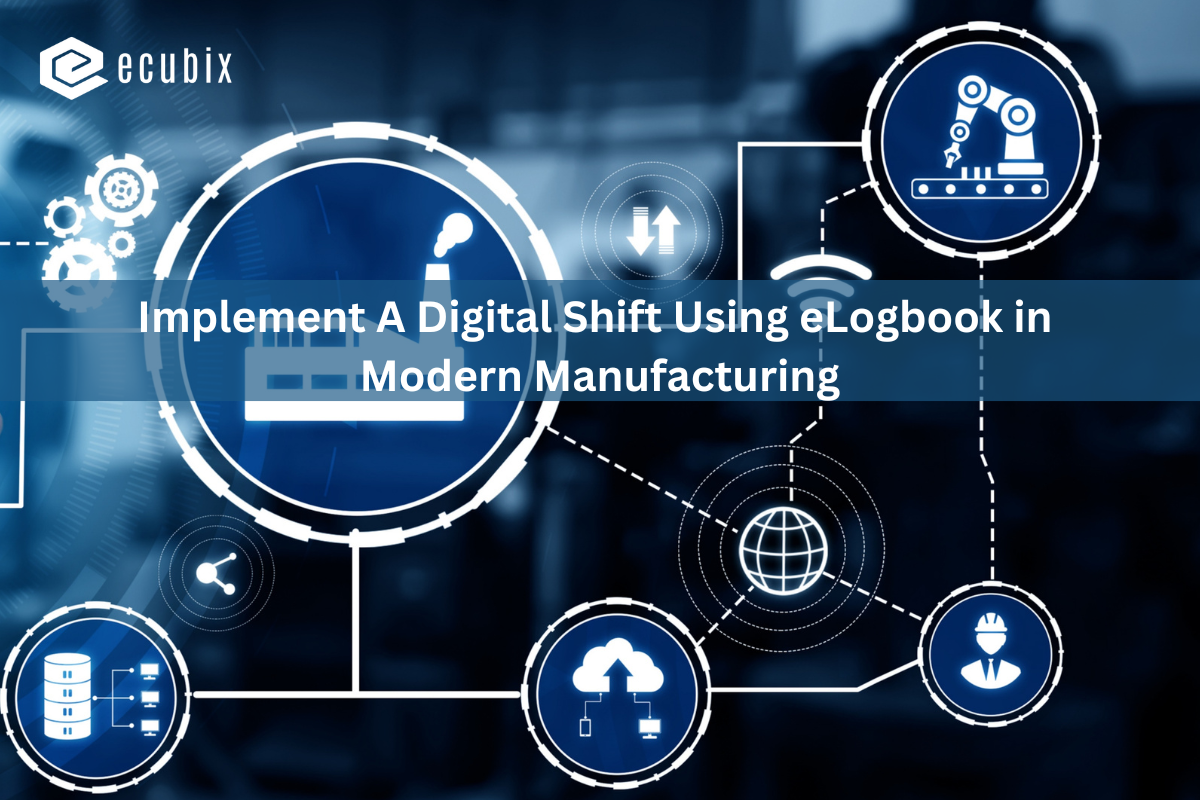Transitioning from a traditional paper-based logbook to an advanced computer-based logbook is the need of the hour. This shift aims to improve efficiency, minimize human error, and enhance communication within manufacturing environments. The eLogbook system replaces traditional paper-based logbooks with electronic versions accessible to all computer users across an organization.
The adoption of the eLogbook system in modern manufacturing is essential for maintaining regulatory compliance and driving digital transformation in the industry. It allows manufacturers to stay competitive and adapt to the evolving needs of the market, ultimately leading to improved productivity and better decision-making.
What is an eLogbook?
An eLogbook, or electronic logbook, is a digital version of the traditional paper logbook used in manufacturing processes. It serves as a comprehensive record-keeping tool that captures, stores and manages data electronically. Key features of an eLogbook include real-time data entry, automated data validation, secure access controls, and integration capabilities with other manufacturing systems. Unlike traditional logbooks, eLogbook eliminates the risk of human error, provides instant access to historical data, and facilitates seamless data sharing across departments.
The Digital Shift in Manufacturing
The digital shift is driven by the need for greater efficiency, accuracy, and real-time insights. The eLogbook is a critical component of this shift, offering manufacturers a robust tool for data management and compliance.
The Digital Shift in Manufacturing refers to the rapid integration of digital technologies into various aspects of production processes, systems, products, and services. This shift enables businesses to increase operational efficiencies, reduce costs, improve quality control, optimize supply chain management, and enhance customer experiences.
By embracing digital solutions, manufacturing companies gain competitive advantages over those lagging in adopting technological innovations. Companies must embrace agility, flexibility, sustainability, and resilience when implementing these changes successfully. Ultimately, it drives growth, increases profitability, enhances brand reputation, and improves employee satisfaction.
Benefits of Digital Shift to eLogbook
The benefits of using an electronic logbook, also known as eLogbook, include:

(1) Reduction in paper use: eLogbook eliminates the need for paper documents, reducing paper waste and promoting environmental sustainability.
(2) Improved visibility into production processes: By using eLogbook, manufacturers can have a better understanding of their production processes and track equipment, raw materials, and finished goods.
(3) Automation of data collection: Electronic logbook automates data collection, reducing the risk of errors due to manual entry and improving the accuracy of records.
(4) Implementation of risk management protocols: eLogbook can help in implementing risk management protocols, ensuring compliance with regulatory standards.
(5) Standardization of performance metrics: eLogbook can help in standardizing performance metrics across the organization, allowing for consistent and accurate measurement of performance.
(6) Centralization of data for analysis: With a digital logbook, data can be easily centralized for analysis and reporting, streamlining the data process and improving efficiency.
(7) Reduced effort and time: By digitizing logbook activities, eLogbook reduces the time and effort spent on manual data input and review, allowing for more focused work on other activities.
(8) Enhanced compliance: eLogbook ensures adherence to regulatory standards by maintaining accurate and up-to-date records, simplifying audits and inspections.
(9) Improved quality control: The precision and accuracy of eLogbook data enhance quality control processes, ensuring that products consistently meet high standards.
(10) Increased safety: eLogbook supports the implementation of safety protocols, helping to identify and mitigate potential risks, thereby enhancing workplace safety.
Implementing Digital Shift to eLogbook in Modern Manufacturing
Implementing the Digital Shift to eLogbook in Modern Manufacturing involves integrating advanced technology into existing manufacturing operations to optimize productivity, efficiency, and communication. To achieve this successful implementation, organizations should follow these steps:
(1) Assess Current Operations: Begin by analyzing the existing manufacturing processes, identifying pain points, and assessing areas where technology can bring value. Determine which tasks would benefit most from digital transformation.
(2) Train Employees: Provide comprehensive training sessions for employees to familiarize them with the new digital tools, encourage questions, address concerns, and demonstrate best practices for utilizing them effectively.
(3) Develop Clear Policies and Procedures: Establish guidelines for how data will be entered, stored, shared, and accessed across departments, ensuring consistency and compliance with relevant regulations. Communicate these policies clearly with all stakeholders involved.
(4) Integrate Data: Combine data gathered from legacy systems with newly acquired data sources to create a comprehensive view of manufacturing operations. Ensure proper data mapping between old and new systems.
(5) Continuous Improvement and Adaptation: Regularly evaluate results and feedback from employees to identify opportunities for improvement, update processes, and adopt emerging trends in digital technologies. Embrace change and be willing to adapt quickly to remain competitive.
Future Trends and Innovations for Digital Shift in Modern Manufacturing
These trends and innovations in the digital shift in modern manufacturing show that there is a strong emphasis on adopting advanced technologies, improving efficiency, and building a resilient industry.

(1) Shifting mindsets for successful digital transformation: Manufacturers need to embrace digital transformation opportunities to build a competitive and resilient future.
(2) Automating routine tasks: In addition to embracing advanced technologies, manufacturers are addressing the impact of labour shortages by automating routine tasks, allowing them to maintain efficiency and productivity.
(3) Building a resilient manufacturing industry: The focus on digitalization and Industry 4.0 and Industry 5.0 has allowed manufacturers to optimize processes, improve quality, and reduce costs, making them more resilient to challenges in the industry.
As manufacturers continue to embrace digital tools, the future landscape of manufacturing promises even more innovations and improvements. Taking proactive steps in adopting a powerful eLogbook is the key to staying ahead of the curve.
FAQs related to The Digital Shift in Manufacturing and eLogbook:
1. How does the adoption of eLogbook facilitate Digital Transformation?
The adoption of an Electronic Logbook (eLogbook) assists in achieving goals aligned with Digital Transformation initiatives by eliminating paperwork, reducing errors due to manual entries, automating data collection, improving traceability, providing better insights into production operations, and contributing towards Industry 4.0 objectives.
2. Why do manufacturers prefer eLogbook over traditional Paper Logbook?
eLogbook offers multiple advantages compared to paper Logbook, including faster retrieval times, higher levels of data security and confidentiality, easier auditing capabilities, instant updates & alerts, automation of reminders and notifications, remote accessibility anytime anywhere, and simplified reporting.
3. Is eLogbook secure enough to store critical company data?
eLogbook employs robust encryption techniques and multi-level authentication methods to safeguard sensitive information stored within them. Compliance with privacy laws like GDPR ensures data protection and confidentiality at every stage.
4. Is eLogbook adoption mandatory for all Manufacturing Industries?
While eLogbook adoption isn’t necessarily mandatory, it serves as a beneficial tool for many manufacturing industries seeking improvements in productivity, accountability, and efficiency.











